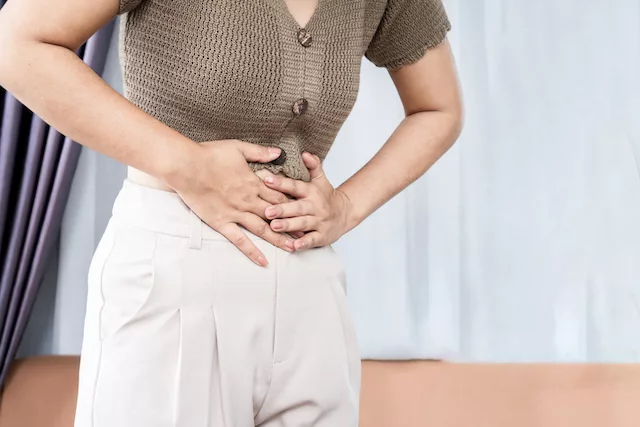[ad_1]
Bloating represents one of the most inconvenient and vexing manifestations of digestion, often leaving us feeling queasy and—at times—experiencing discomfort after a meal. Although bloating is a prevalent digestive symptom and is typically harmless, delving into the root cause of bloating and addressing some of the potential triggers can significantly affect our overall health and well-being.
“The term bloating refers to an unpleasant sensation of constriction, pressure, or fullness in our midsection,” remarked Brittany Werner, MS, RDN, LDN, the coaching director at Working Against Gravity. While we commonly link bloating with abdominal distension, Werner noted that this is not always the case, and the feeling of bloating can occur without obvious visual cues. Instead, one might notice a snugness in their clothing, which Werner stated could persist from a few hours to several days in more severe instances. “Bloating can vary from mild discomfort for some to severe pain in other cases,” she added, clarifying that this discomfort typically dissipates, though for some, it can be a recurring issue.
Ahead, we will investigate the prevalent triggers of bloating, as well as strategies for combatting bloating through several essential digestion techniques.
Common Triggers of Bloating
Prior to delving into ways to eliminate bloating, it is crucial to grasp the common causes of bloating, as this awareness might help in preempting the discomfort. According to Werner, several common causes of bloating revolve around eating patterns, including rapid eating and overeating. Constipation, food sensitivities, and hormonal fluctuations (such as those experienced during menstrual cycles) can also lead to bloating. Moreover, the consumption of foods high in added sugars and fats can impact the body, inducing the sensation—and at times, the appearance—of bloat.
Ways to Eliminate Bloating
Addressing bloating begins with addressing some of the prevalent triggers within our control, such as moderating sugar and saturated fat intake, and avoiding foods known to cause sensitivities. Another approach to alleviating bloating involves practicing mindful chewing and eating at a moderate pace to prevent excessive air intake, thereby averting bloating. Subsequently, addressing your digestion is crucial.
“Digestion is a crucial bodily process through which our body breaks down the food we consume and extracts nutrients to fuel our bodies,” stated Werner. One of the most effective mechanisms for combatting bloating is harnessing the body’s intrinsic digestive enzymes, as Werner elucidated that these are natural proteins which dismantle food and support the overall digestion process. “The process of digestion commences in the mouth, as our saliva initiates the breakdown of food into a form that the body can absorb,” she expounded, highlighting that digestive enzymes are produced by the stomach, small intestine, and pancreas. “The pancreas is pivotal in digestion as it generates the most vital digestive enzymes, responsible for breaking down micronutrients, carbohydrates, proteins, and fats.”
However, certain individuals may lack adequate digestive enzymes, or their bodies may fail to release them as needed. “This condition is recognized as exocrine pancreatic insufficiency (EIP), leading to an inability to break down certain foods and absorb nutrients,” explained Werner, adding that this condition is relatively rare and typically occurs more frequently in individuals with medical conditions such as type 1 and type 2 diabetes, inflammatory bowel disease (IBD), and pancreatic cancers. “Common symptoms of digestive enzyme insufficiency encompass abdominal pain or cramps, excessive bloating, sudden onset diarrhea, gas, oily stools, and unexplained weight loss,” Werner appended.
In certain instances, employing a digestive enzyme supplement may aid in alleviating bloating (more on that below!).


Strategies for Alleviating Bloating Through Digestion Hacks
As mentioned, numerous methods exist for alleviating bloating through adjustments in both lifestyle and eating habits, as well as via medical intervention to address digestion-related conditions such as EIP. Below, we delineate some of the top digestion strategies for bloating.
Monitor Your Fiber Consumption
If you do not typically incorporate plentiful high-fiber foods into your diet and desire to enhance your whole food intake, Werner recommended proceeding cautiously at first. “Gradually raise your fiber intake to allow your digestive system to acclimate,” she advised, underscoring that high-fiber foods could induce gas and bloating, particularly if you are unaccustomed to consuming them regularly. “Aim for soluble fiber sources such as oats, legumes, and fruits, as they are gentler on the digestive system.”
Restrict Gas-Inducing Foods
Another approach to alleviating bloating involves identifying and minimizing foods known to cause gas, according to Werner. These may encompass legumes, broccoli, cabbage, onions, and carbonated beverages. “These triggers can vary for each person, as digestive systems differ, so exercise patience when introducing and excluding foods,” Werner recommended. “Exercise particular caution with artificial sweeteners, as they can also contribute to bloating,” she emphasized, singling out sweeteners such as sorbitol, mannitol, and xylitol as points of concern.
Regulate Meal Sizes
To alleviate bloating, Werner also advised managing meal sizes. “Consuming large meals can place additional pressure on your stomach, contributing to bloating,” she elucidated. “Consider opting for smaller, more frequent meals throughout the day to reduce the overall volume in your stomach.”
Cultivate Mindful Eating Habits
Werner also advocated for adopting a slower, mindful approach to eating. “Chew your food thoroughly and consume your meals at a leisurely pace to avoid swallowing air, which can lead to bloating,” she stressed. As individuals often engage in other activities while eating—such as browsing their phones or watching TV—Werner underscored the importance of mindfulness and prioritizing the act of eating. “Sit down, savor your food slowly, and partake in your meal intentionally—allowing your saliva’s digestive enzymes to take effect.”
Stay Hydrated, Stay Hydrated, Stay Hydrated
Bolstering water intake (or addressing its inadequacy) represents another method to mitigate bloating. “Consume ample water throughout the day to prevent constipation, which can contribute to bloating,” Werner advised. For most non-athletic individuals, Werner proposed commencing with 64 ounces of water per day. Nonetheless, for those residing in warmer environments, she suggested adjusting this quantity if necessary.
In case of high temperatures or increased physical activity, it may be necessary to consume additional water. Alongside the intake of water, Werner suggests restricting the intake of fizzy drinks as the bubbles can contribute to abdominal distension.
Detecting Food Sensitivities
Identifying food sensitivities becomes crucial as they can lead to abdominal distension and discomfort during digestion. Werner recommends maintaining a food journal to monitor meals and symptoms, enabling the identification of specific foods that may cause bloating or discomfort. “If you observe a correlation between foods and symptoms, consider following an exclusion diet under the guidance of a registered dietitian or seeking assistance to better recognize and eliminate potential triggering foods,” she advises.
Using HUM Nutrition’s Flatter Me to Alleviate Bloating
Integrating a digestive enzyme supplement into your daily routine might also help alleviate symptoms of bloating. HUM Nutrition’s Flatter Me is specifically formulated to target bloating and enhance overall digestion. Its composition includes 18 comprehensive digestive enzymes in addition to peppermint, ginger, and fennel seeds.
“Peppermint is widely recognized in traditional medicine for its ability to soothe digestive issues,” says Werner. She points out that certain studies indicate that the plant compounds present in peppermint “may impede the activity of immune cells located in the gut, which can contribute to bloating.” Furthermore, peppermint is acknowledged for its capability to relax the gut, thereby relieving intestinal spasms and the associated bloating and discomfort,” she explains.
Ginger, another potent ingredient for digestive support, offers benefits in gastrointestinal motility, which affects the pace at which food moves through the digestive process,” notes Werner. “Incorporating ginger into your diet can promote efficient digestion, preventing food from lingering too long in your gut and potentially causing bloating,” she adds.
Fennel seeds contribute to digestion by providing added dietary fiber. “They are recognized for several health benefits, including anti-inflammatory properties and aiding in the reduction of intestinal irritation,” cites Werner. “Moreover, fennel seeds can relax intestinal muscles, assisting in alleviating constipation,” she mentions, pointing out that certain studies also demonstrate their ability to prevent gas build-up.
The Conclusion
To address bloating, it’s essential to first assess your eating patterns, as bloating is often influenced by the speed, content, and quantity of food intake. Additionally, maintaining adequate hydration supports overall digestive health and promotes efficient waste elimination, reducing the likelihood of bloating. Should further assistance be required, incorporating a digestive enzyme supplement such as HUM Nutrition Flatter Me can serve as an effective remedy.
Obtain Sales to Businesses at a discounted rate while it’s still accessible…
[ad_2]


